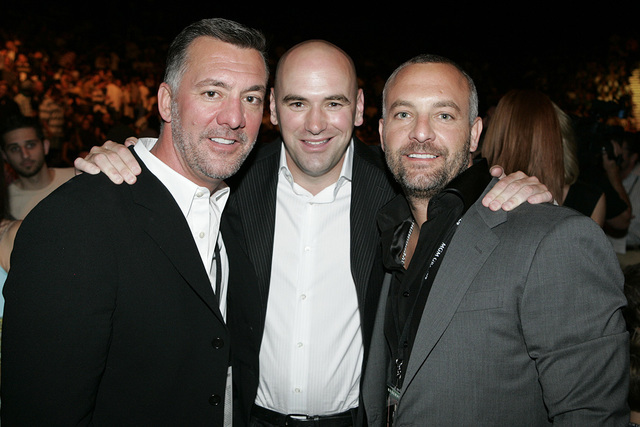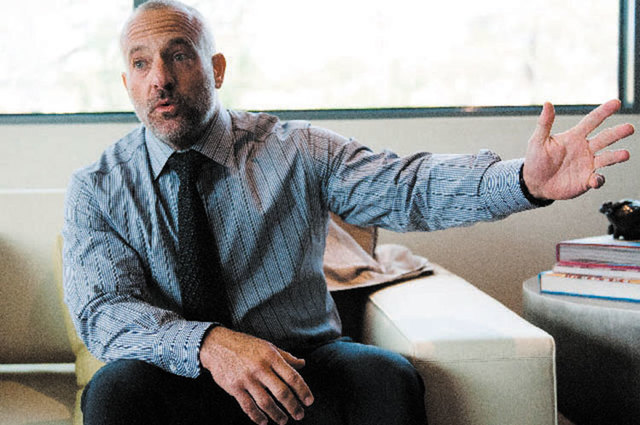Lorenzo Fertitta marvels at UFC’s growth since UFC 100


During the week of UFC 100 in July 2009 and through that historic night of fights, Lorenzo Fertitta began to get a sense of just how big his Las Vegas-based mixed martial arts organization had grown.
It wasn’t until two days later, however, when Fertitta truly knew the UFC had turned the corner into the mainstream of the sports world.
“I remember that was the first time I heard general sports media and all the talk shows discussing our event on a Monday,” the UFC CEO said in his office last week. “We were the talk of Monday. Now we kind of take that for granted when Conor (McGregor) or Ronda (Rousey) or somebody like that fights.
“But I remember really thinking that was cool.”
It was also a seminal moment for the organization. Fertitta largely credits that event for helping spur the UFC’s growth around the world, and perhaps just as important, as the impetus for a deal with Fox that put the organization on network TV.
“I think UFC 100 was really one of those eye-opening moments that helped lead us to be able to secure a deal like that,” Fertitta said. “We kind of had that night and moment in time. The first season of “The Ultimate Fighter” was a big deal, some of the Chuck (Liddell) fights with Randy (Couture) and Tito (Ortiz) where we were able to break into the mainstream, certainly. But UFC 100 took things to a whole different level.”
The numbers back up the assertion. Since that event, the UFC has grown its roster from about 200 to more than 500 and added five new weight divisions, including the first two for women.
The company went from about 28 events annually to 42 in 2016 as it prepares for three cards in Las Vegas this week, culminating with milestone UFC 200 on Saturday at T-Mobile Arena.
Two competitors — World Extreme Cagefighting and Strikeforce — were acquired, and the UFC expanded its broadcast reach from 415 million homes to more than 1.1 billion.
The organization also launched a digital subscription service, successfully lobbied for the legalization of MMA in New York and tasked the U.S. Anti-Doping Agency with administering a drug testing program.
UFC is building a new corporate headquarters in Southwest Las Vegas and has opened international offices in four countries, all since UFC 100.
Fertitta credits many of the investments the company has made, in capital and people, for the continued success of the organization.
“It’s always hard to pinpoint any specific things as far as why you continue to see growth, but I think the biggest thing is from an organizational standpoint, we have put in a lot of what I’ll call infrastructure,” he said. “A lot of key hires. I don’t think people understand the magnitude of what it takes to make this thing run every day and what it takes to make it tick. (We made) the commitment to bring on top-notch executives and talented people to run the organization, not just in Las Vegas.”
Bill Robinson, an assistant professor of economics at UNLV’s Lee Business School, said that while sports entities have consistently proven to be strong investments, the UFC’s rate of growth has been “remarkable.”
He credits much of the company’s success to identifying and pleasing its customers.
“They developed a really good strategy,” he said. “They got a reality show on a cable network that hooked them into a bunch of other stuff. They have relatively inexpensive pay per views that happen all the time, so they have ways to suck the customer in and keep them actively involved.
“So while boxing has faded during this time, in part because boxing wasn’t anywhere on free TV and the pay per views are expensive and irregular, they’ve done things to realize who their clientele is and really connect with them. They’ve been really smart about that.”
Exactly how much the company has grown is difficult to pinpoint. The UFC is a private company and extremely guarded about financial information.
There are rumors circulating that the company Fertitta and his brother Frank Fertitta II, along with UFC president Dana White, purchased in 2001 for $2 million is on the verge of being sold for more than $4 billion.
Lorenzo Fertitta declined comment on the reports, but conceded the company being attached to that type of figure brings a sense of satisfaction.
“I think what it is you can look at it when somebody is reporting that, whether it’s true or not true, it’s fulfilling to know that we built something that most importantly is sustainable,” he said. “It’s a sustainable business that is here. It’s arrived, and it’s not going anywhere no matter what happens.”
A major reason he can take such pride in the company’s success is how hands-on he has remained despite all the growth. Either Lorenzo Fertitta or White still approves every UFC ad, and they still sit in on rehearsals of every show to make sure the timing of everything from the walkouts to the video packages is precise.
It’s attributable to what Lorenzo Fertitta learned about business from his father, Frank Fertitta Jr., who was around the Palace Station, then the Bingo Palace every day in the early years to make sure things ran smoothly. As the business expanded, that became impossible. But Frank Fertitta Jr. still tried to make sure he was involved as possible on a daily basis.
“I learned a ton from my father. I really did,” Lorenzo Fertitta said. “I was always taught by my father that culture and environment is a big thing.”
He also learned about delivering a coherent message. Fertitta remembers his dad driving him around town and showing him properties on The Strip with cluttered signage about all the offerings on the property.
“He would say, ‘Never do that. You have one message, clean and crisp, so people can read it,’” Fertitta said. “A lot of those principles carry over to our advertising and our graphics. We try to keep everything simple and clean. Sometimes people might think we get a little boring or whatever, but everything is very to the point. This is the fight, this is where it is, this is the date. Boom, boom, boom. It goes back to the early days with my dad.”
Fertitta also learned to continuously move forward. It’s part of the reason the massive success of UFC 100 only led him to push harder at expanding the global reach of the company.
“Part of the challenge of this business is not getting caught on the hamster wheel,” he said. “It’s always event to event to event. It’s a bit of a traveling circus to some extent. We don’t have a whole lot of time to reflect or pat ourselves on the back. It’s more, ‘OK, that competitive drive of UFC 100 just happened, how are we going to top that?’ What’s next, and how are we going to do better? That’s just kind of the way the culture of the company is.”
Fertitta said this week is starting to feel like UFC 100 all over again with a palpable buzz around the valley surrounding all the fan events for International Fight Week, three UFC cards, including the organization’s debut at T-Mobile Arena, and an expanded Fan Expo at Las Vegas Convention Center.
If Fertitta and his partners are on the verge of cashing out, it’s certainly not because of a lack of optimism about the UFC’s future.
“I’ve never been more bullish on the business,” Fertitta said. “When you think about what’s ahead of us in terms of talent development, the investments we’re making in Latin America, some of the young stars that are coming along, there has never been a time when we’ve had more momentum. We’ve got New York coming around. We’re just going to keep pushing and promoting and do what we do.”
People are sure to be talking about it on Monday and beyond.
Contact reporter Adam Hill at ahill@reviewjournal.com or 702-224-5509. Follow him on Twitter: @adamhilllvrj












